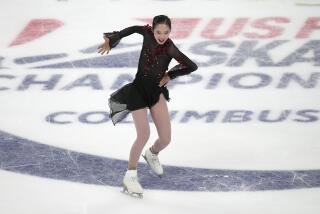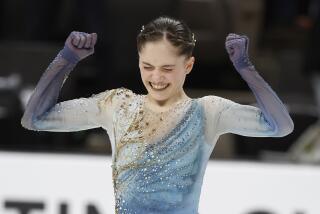Favorites Get Caught Short
- Share via
SASKATOON, Canada — The Skate Canada staredown between Olympic gold medal favorites Irina Slutskaya and Michelle Kwan fizzled Friday, when both women blinked.
After both botched their combination jumps in their short programs, Sarah Hughes breezed through to take the lead into tonight’s free skate final at Saskatchewan Place, the first time the 16-year-old has led a competition after the short program and the second time she has led Kwan. The previous occasion was at the 2000 U.S. national championships, when Sasha Cohen, Hughes and Kwan occupied the first three spots, before Kwan rallied to win.
“I don’t think about anybody else. I’m here to skate and I know I’m capable of being one of the best,” said Hughes, who was ranked first by six of seven judges. “That’s my job right now.”
Kwan was second, ahead of Japan’s Fumie Suguri--who got the first-place vote of the Japanese judge--and Russian champion Slutskaya. That extended her string of flawed performances in a season more like a roller coaster ride than the anticipated waltz to a February Olympic coronation.
Slutskaya did a double lutz-double loop combination instead of a triple-double and was penalized on her required-element scores, which included one 5.0 (out of 6.0).
“For two years, I am skating clean my short program,” she said. “I was surprised today. ... Maybe I was a little nervous because it is my first [Grand Prix] competition of the season. I feel not so great with my body.”
Hughes’ performance to “Ave Maria” was well received by the crowd of 8,111 but the judges’ marks left room for Kwan to overwhelm them. But like last week’s Skate America competition, where Kwan reduced the difficulty of several jumps in her first event since firing longtime coach Frank Carroll, she didn’t approach the form that has made her a four-time world champion.
Kwan fell on the landing of her triple lutz, the first part of her required combination jump, and didn’t complete it. Yet, whether because of home-continent advantage or her superior resume, she wasn’t penalized as severely as Slutskaya had been. Kwan’s marks ranged from 5.2 to 5.4 for the required elements and 5.7 to 5.9 for presentation.
“I felt really good when I went out there for the warmup, and when the music came on, I felt awesome,” said Kwan, who has yet to perform a program as planned in four competitions this season. “It was a little bit of a shock [to fall] because I haven’t missed a lutz in practice all week.”
Kwan can win tonight if she wins the long program--and she has added a second triple-triple combination to beef up the difficulty of her 4-minute, 10-second routine. She plans to perform a triple lutz-triple loop after her opening triple toe loop-triple toe loop combination.
Hughes rated her performance as better than at Skate America, where she wowed the crowd but finished second to Kwan on a 5-2 decision in the long program. “Last weekend I was able to get the kinks out,” she said. “Today I was really relaxed and felt like I could focus.”
World pair champions Jamie Sale and David Pelletier of Canada topped the scorecards of all seven judges and won their second successive Skate Canada title. They also qualified for the Grand Prix final in December at Kitchener, Canada, and solidified their status as Olympic favorites, but Pelletier claimed he isn’t looking that far ahead.
“I’ll keep those sleepless nights until after January,” he said.
Tatiana Totmianina and Maxim Marinin of Russia, who performed a strong program to “West Side Story,” finished second. Isabelle Langlois and Patrice Archetto of Canada were third in their first Grand Prix event.
U.S. teams struggled: Stephanie Kalesavich and Aaron Parchem were fifth, and Danielle and Steve Hartsell were eighth.
In ice dancing, Shae-Lynn Bourne and Victor Kraatz of Canada maintained their lead after the original dance.
The men’s competition will also end tonight with the free skate. Alexei Yagudin of Russia was first after the short program, followed by Emanuel Sandhu and Elvis Stojko of Canada and Todd Eldredge of the U.S..
More to Read
Go beyond the scoreboard
Get the latest on L.A.'s teams in the daily Sports Report newsletter.
You may occasionally receive promotional content from the Los Angeles Times.








